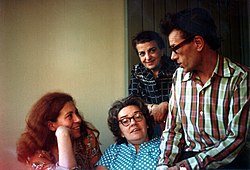Soviet dissidents
Soviet dissidents were people who disagreed with some or all of Soviet ideology and who were willing to speak out against them. The term dissident was used in the Soviet Union from the mid-1960s until the fall of communism. These people were mostly intellectuals. They challenged the Soviet regime in various ways. They were encouraged by foreign journalists but often prosecuted or silenced by the government.[1]
Soviet Dissidents Media
Moscow Helsinki Group members Yuliya Vishnevskya, Lyudmila Alexeyeva, Dina Kaminskaya, Kronid Lyubarsky in Munich, 1978
A Chronicle of Current Events No 11,*31 December 1968 (front cover)
Yelena Bonner and Andrei Sakharov after their arrival for the conferment of the honorary doctorate in law from the University of Groningen, 15 June 1989
References
- ↑ Smith, Stephen (2014). The Oxford handbook of the history of communism. OUP Oxford. p. 379. ISBN 978-0199602056.


